人教版九年级全册Unit 1 How can we become good learners. Section B 4a-4c课件(共28张PPT)
文档属性
| 名称 | 人教版九年级全册Unit 1 How can we become good learners. Section B 4a-4c课件(共28张PPT) |  | |
| 格式 | pptx | ||
| 文件大小 | 5.0MB | ||
| 资源类型 | 教案 | ||
| 版本资源 | 人教新目标(Go for it)版 | ||
| 科目 | 英语 | ||
| 更新时间 | 2023-08-05 15:30:21 | ||
图片预览

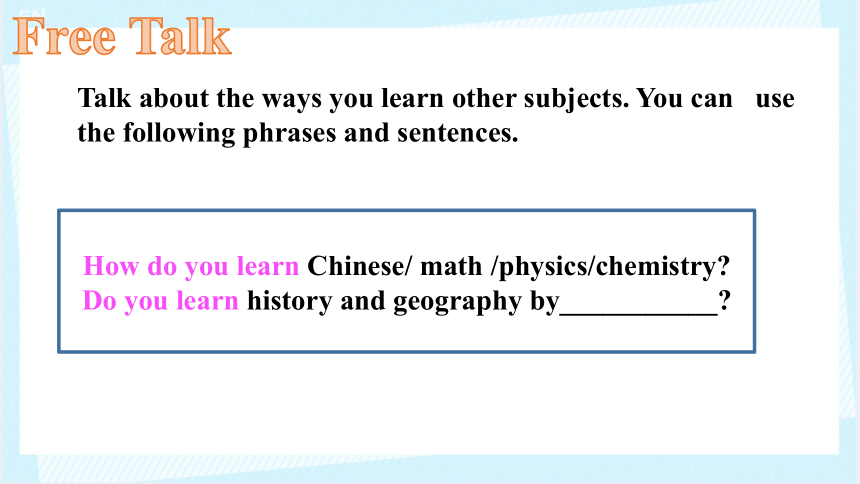
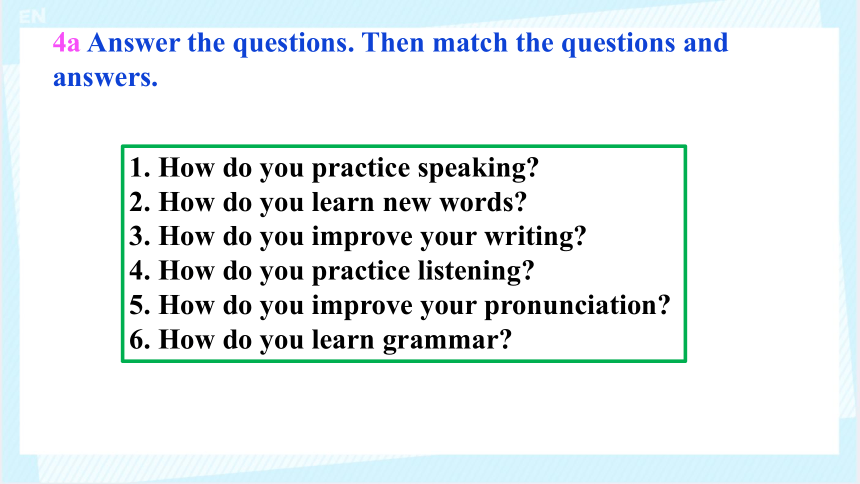
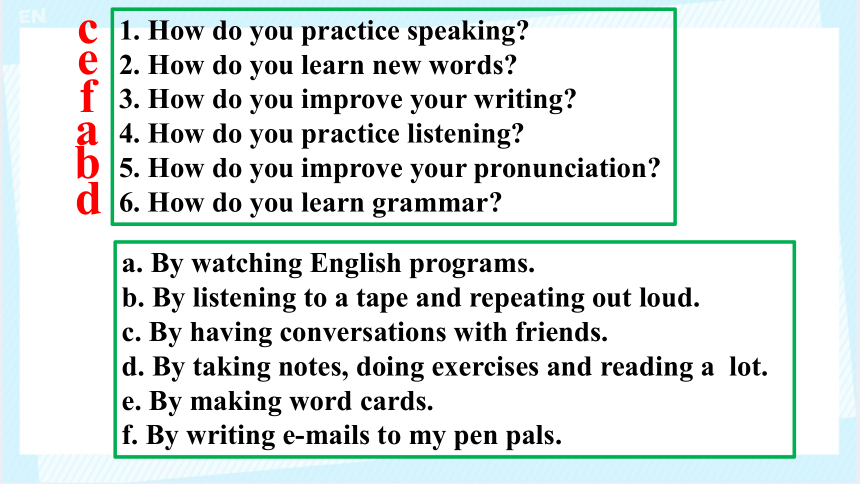
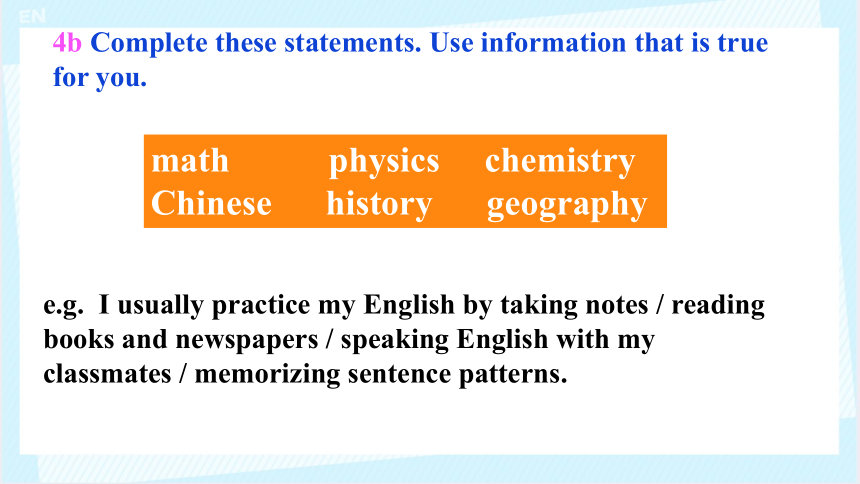
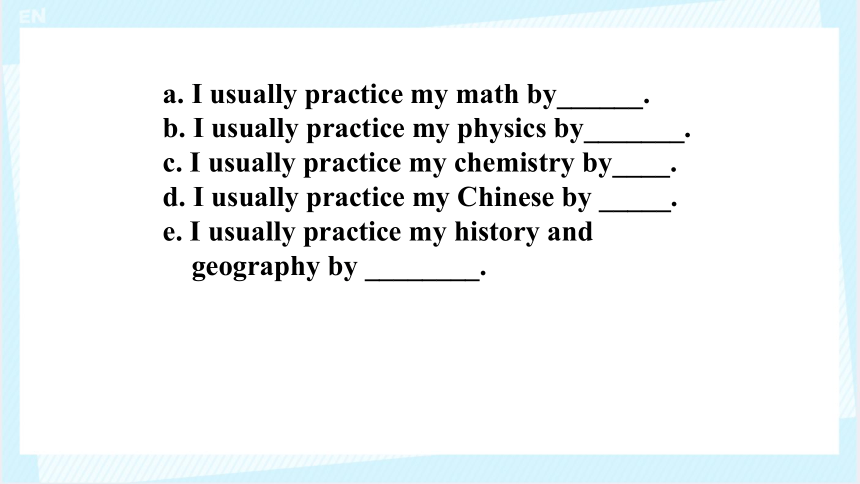
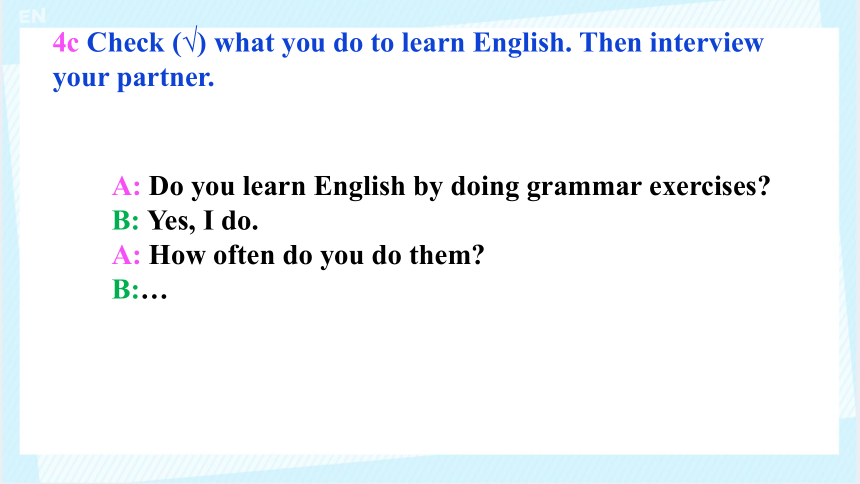
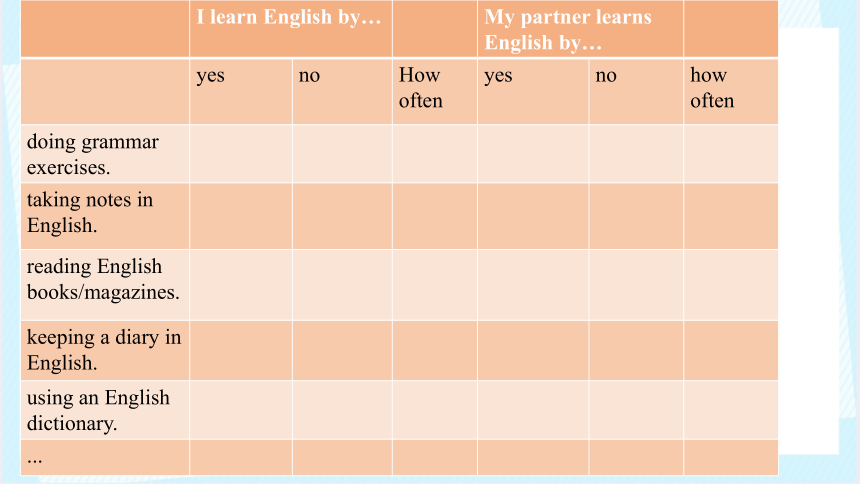
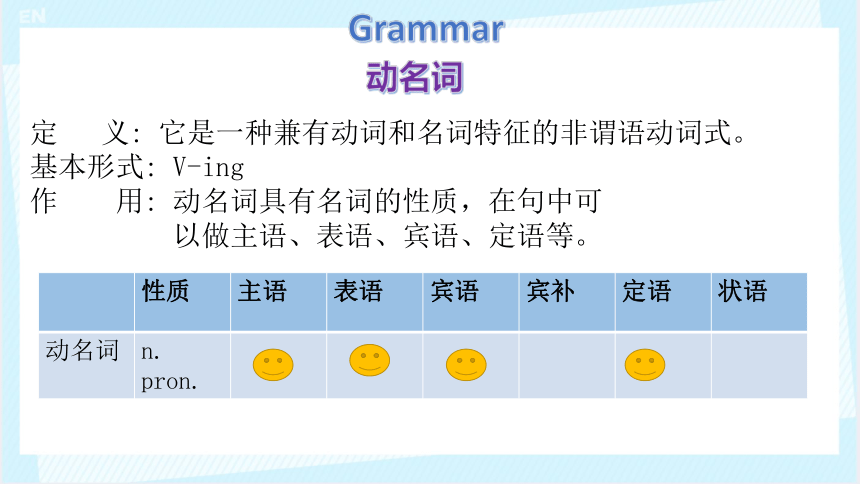
文档简介
(共28张PPT)
Unit 1 How can we become good learners
Section B 4a-4c
Free Talk
Talk about the ways you learn other subjects. You can use the following phrases and sentences.
How do you learn Chinese/ math /physics/chemistry
Do you learn history and geography by___________
4a Answer the questions. Then match the questions and answers.
1. How do you practice speaking
2. How do you learn new words
3. How do you improve your writing
4. How do you practice listening
5. How do you improve your pronunciation
6. How do you learn grammar
1. How do you practice speaking
2. How do you learn new words
3. How do you improve your writing
4. How do you practice listening
5. How do you improve your pronunciation
6. How do you learn grammar
a. By watching English programs.
b. By listening to a tape and repeating out loud.
c. By having conversations with friends.
d. By taking notes, doing exercises and reading a lot.
e. By making word cards.
f. By writing e-mails to my pen pals.
c
e
f
a
b
d
4b Complete these statements. Use information that is true for you.
math physics chemistry
Chinese history geography
e.g. I usually practice my English by taking notes / reading books and newspapers / speaking English with my classmates / memorizing sentence patterns.
a. I usually practice my math by______.
b. I usually practice my physics by_______.
c. I usually practice my chemistry by____.
d. I usually practice my Chinese by _____.
e. I usually practice my history and
geography by ________.
4c Check (√) what you do to learn English. Then interview your partner.
A: Do you learn English by doing grammar exercises
B: Yes, I do.
A: How often do you do them
B:…
I learn English by… My partner learns English by…
yes no How often yes no how often
doing grammar exercises.
taking notes in English.
reading English books/magazines.
keeping a diary in English.
using an English dictionary.
...
Grammar
动名词
定 义: 它是一种兼有动词和名词特征的非谓语动词式。
基本形式: V-ing
作 用: 动名词具有名词的性质,在句中可
以做主语、表语、宾语、定语等。
性质 主语 表语 宾语 宾补 定语 状语
动名词 n. pron.
动名词的基本用法
1. 用作主语
所表动作比较抽象,或者泛指习惯性的动作。
e.g. Playing with fire is dangerous.
注意:动名词做主语,有时先用it作形式主语,把动名词置于句末。这种用法在习惯句型中常用。
1) It is no use/ good / useless + doing…
2) It is a waste of time + doing …
3) It is fun + doing …
在以上结构中常用动名词作主语。
e.g. It’s no use crying over spilt milk.
(覆水难收)
It is fun playing with children.
和孩子们一起玩真好。
2. 用作宾语
1) 作动词的宾语
常见的此类动词有:
practice 练习
enjoy 喜欢
finish 结束
give up 放弃
cannot help 控制不住
keep 一直
keep on 坚持
mind 介意
feel like 想要 miss 错过
put off 拖迟
depend on 依靠
think about 考虑
succeed in 成功
worry about 担心
be used to 习惯于
get used to 习惯于
look forward to 期待
pay attention to 注意
2) 作介词的宾语
1. I learn English by doing grammar exercises.
2. Shall we have a rest or get down to doing our work
3. He was late again because of getting up late.
4. Lock the doors and windows before going out.
5. What/How about the two of us playing games?
活学活用
1. She can’t help ________ (cry) after _________ (hear) the bad news.
2. Do you feel like _______ (have) a break
crying
hearing
having
3) 既可接动名词又可接不定式的常用动词有:remember, forget, regret, mean, try等,但表达的意义不同。
e.g. I remember seeing her at the hotel.
我记得在宾馆见过她。(动作发生了)
I will remember to see her at the hotel.
我记着要去宾馆见她。(动作尚未发生)
3.作表语
动名词作表语时句子主语常是表示无生命的事物的名词或what引导的名词性从句。表语动名词与主语通常是对等的关系,表示主语的内容,主语、表语可互换位置。
e.g. Your task is cleaning the windows.
你的任务就是擦窗户。
(Cleaning the windows is your task.)
What I hate most is being laughed at. 我最痛恨的就是被别人嘲笑。
(Being laughed at is what I hate most.)
活学活用
选择题
1. My watch needs ________, but I have no time to go to town to have it _______.
A. to repair; repaired
B. to be repaired; repairing
C. repairing; repaired
D. being repaired; repaired
2. You should apologize to your sister for _____ her the truth.
A. telling B. not telling C. telling not D. not tell
3. ---The light in the office is still on.
---Oh, I forgot ___________ it off.
A. turning B. turn C. to turn D. having turned
C
B
C
4. Hearing the bad news, the mother couldn’t help ________.
A. to cry B. crying C. cry D. cries
5. Our teacher told us to spend some time _______ English every day.
A. to practise speaking
B. practising speaking
C. to practise to speak
D. practising to speak
6. It is no use _______ without doing.
A. to promise B. promising
C. promise D. to be promised
B
B
B
Homework
Write a short composition about how to learn English.
Unit 1 How can we become good learners
Section B 4a-4c
Free Talk
Talk about the ways you learn other subjects. You can use the following phrases and sentences.
How do you learn Chinese/ math /physics/chemistry
Do you learn history and geography by___________
4a Answer the questions. Then match the questions and answers.
1. How do you practice speaking
2. How do you learn new words
3. How do you improve your writing
4. How do you practice listening
5. How do you improve your pronunciation
6. How do you learn grammar
1. How do you practice speaking
2. How do you learn new words
3. How do you improve your writing
4. How do you practice listening
5. How do you improve your pronunciation
6. How do you learn grammar
a. By watching English programs.
b. By listening to a tape and repeating out loud.
c. By having conversations with friends.
d. By taking notes, doing exercises and reading a lot.
e. By making word cards.
f. By writing e-mails to my pen pals.
c
e
f
a
b
d
4b Complete these statements. Use information that is true for you.
math physics chemistry
Chinese history geography
e.g. I usually practice my English by taking notes / reading books and newspapers / speaking English with my classmates / memorizing sentence patterns.
a. I usually practice my math by______.
b. I usually practice my physics by_______.
c. I usually practice my chemistry by____.
d. I usually practice my Chinese by _____.
e. I usually practice my history and
geography by ________.
4c Check (√) what you do to learn English. Then interview your partner.
A: Do you learn English by doing grammar exercises
B: Yes, I do.
A: How often do you do them
B:…
I learn English by… My partner learns English by…
yes no How often yes no how often
doing grammar exercises.
taking notes in English.
reading English books/magazines.
keeping a diary in English.
using an English dictionary.
...
Grammar
动名词
定 义: 它是一种兼有动词和名词特征的非谓语动词式。
基本形式: V-ing
作 用: 动名词具有名词的性质,在句中可
以做主语、表语、宾语、定语等。
性质 主语 表语 宾语 宾补 定语 状语
动名词 n. pron.
动名词的基本用法
1. 用作主语
所表动作比较抽象,或者泛指习惯性的动作。
e.g. Playing with fire is dangerous.
注意:动名词做主语,有时先用it作形式主语,把动名词置于句末。这种用法在习惯句型中常用。
1) It is no use/ good / useless + doing…
2) It is a waste of time + doing …
3) It is fun + doing …
在以上结构中常用动名词作主语。
e.g. It’s no use crying over spilt milk.
(覆水难收)
It is fun playing with children.
和孩子们一起玩真好。
2. 用作宾语
1) 作动词的宾语
常见的此类动词有:
practice 练习
enjoy 喜欢
finish 结束
give up 放弃
cannot help 控制不住
keep 一直
keep on 坚持
mind 介意
feel like 想要 miss 错过
put off 拖迟
depend on 依靠
think about 考虑
succeed in 成功
worry about 担心
be used to 习惯于
get used to 习惯于
look forward to 期待
pay attention to 注意
2) 作介词的宾语
1. I learn English by doing grammar exercises.
2. Shall we have a rest or get down to doing our work
3. He was late again because of getting up late.
4. Lock the doors and windows before going out.
5. What/How about the two of us playing games?
活学活用
1. She can’t help ________ (cry) after _________ (hear) the bad news.
2. Do you feel like _______ (have) a break
crying
hearing
having
3) 既可接动名词又可接不定式的常用动词有:remember, forget, regret, mean, try等,但表达的意义不同。
e.g. I remember seeing her at the hotel.
我记得在宾馆见过她。(动作发生了)
I will remember to see her at the hotel.
我记着要去宾馆见她。(动作尚未发生)
3.作表语
动名词作表语时句子主语常是表示无生命的事物的名词或what引导的名词性从句。表语动名词与主语通常是对等的关系,表示主语的内容,主语、表语可互换位置。
e.g. Your task is cleaning the windows.
你的任务就是擦窗户。
(Cleaning the windows is your task.)
What I hate most is being laughed at. 我最痛恨的就是被别人嘲笑。
(Being laughed at is what I hate most.)
活学活用
选择题
1. My watch needs ________, but I have no time to go to town to have it _______.
A. to repair; repaired
B. to be repaired; repairing
C. repairing; repaired
D. being repaired; repaired
2. You should apologize to your sister for _____ her the truth.
A. telling B. not telling C. telling not D. not tell
3. ---The light in the office is still on.
---Oh, I forgot ___________ it off.
A. turning B. turn C. to turn D. having turned
C
B
C
4. Hearing the bad news, the mother couldn’t help ________.
A. to cry B. crying C. cry D. cries
5. Our teacher told us to spend some time _______ English every day.
A. to practise speaking
B. practising speaking
C. to practise to speak
D. practising to speak
6. It is no use _______ without doing.
A. to promise B. promising
C. promise D. to be promised
B
B
B
Homework
Write a short composition about how to learn English.
同课章节目录
- Unit 1 How can we become good learners.
- Section A
- Section B
- Unit 2 I think that mooncakes are delicious!
- Section A
- Section B
- Unit 3 Could you please tell me where the restroom
- Section A
- Section B
- Unit 4 I used to be afraid of the dark.
- Section A
- Section B
- Unit 5 What are the shirts made of?
- Section A
- Section B
- Review of Units 1-5
- Unit 6 When was it invented?
- Section A
- Section B
- Unit 7 Teenagers should be allowed to choose their
- Section A
- Section B
- Unit 8 It must belong to Carla.
- Section A
- Section B
- Unit 9 I like music that I can dance to.
- Section A
- Section B
- Unit 10 You're supposed to shake hands.
- Section A
- Section B
- Review of Units 6-10
- Unit 11 Sad movies make me cry.
- Section A
- Section B
- Unit 12 Life is full of the unexpected
- Section A
- Section B
- Unit 13 We're trying to save the earth!
- Section A
- Section B
- Unit 14 I remember meeting all of you in Grade 7.
- Section A
- Section B
- Review of Units 11-14
